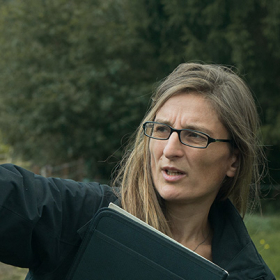

Els B., revisore principale
"Occuparmi di audit presso la Corte dei conti europea è davvero interessante. Ho avuto l'opportunità di lavorare su una serie di temi diversi, tra cui il sistema di navigazione satellitare Galileo, la politica dell'UE in materia di acque, la certificazione dei prodotti biologici o le energie rinnovabili. Parlare con esperti del settore arricchisce e consente di comprendere le sfumature dell'oggetto delle nostre revisioni. Qui alla Corte dei conti europea ci troviamo in una posizione privilegiata, perché riusciamo ad avere una visione d'insieme di tutti i pezzi del puzzle: le norme dell'UE, il ruolo della Commissione, l'organizzazione degli Stati membri, le esigenze e le riflessioni dei beneficiari, il modo in cui le lobby o i gruppi d'azione considerano la situazione e quali sono le sfide per attuare una politica."
Revisore principale, Sezione I – Uso sostenibile delle risorse naturali, Corte dei conti europea

Renée Idzerda, linguistic assistant for the Dutch Translation Unit
After gaining 15 years of experience in the private sector (mainly in internal and external communication), I joined the European Commission in 2013 and took up my current position at Directorate-General for Translation (DGT).
As a translation assistant at the European Commission, you are always in the middle of the news. Whereas in other Directorate-Generals the focus is on one policy area, at DGT all possible themes are covered. And we receive all types of text formats, such as legislative proposals, decisions, speeches, press releases, letters, etc. We are therefore always involved in current EU policy.
As an assistant you are at the service of others: translators, the head of unit, other assistants, etc. There is always someone who needs your help. Moreover, translators work to strict deadlines. Being able to quickly assess what is important, i.e. recognising priorities, is therefore a must. Especially as these priorities can change. In order to deal with unexpected twists in the planning, you need to have talent for organising. Good teamwork and communication with colleagues are also crucial.
As a translation assistant, you have many diverse responsibilities. It is therefore a plus if you like multi-tasking. Moreover, you work very independently: each assistant handles (every aspect of) the translation requests within his or her portfolio. The work is therefore varied. Translators count on you to spontaneously jump in where you can, so that they can focus on their work.
When I started out as a translation assistant, I had a lot to deal with. Fortunately, DGT provides all the necessary training. Moreover, during your induction period you are coached by experienced colleagues, either from your own or from another language department. Continuous training is encouraged. And this is very welcome, because the translation world quickly evolves, also from a technological point of view. Only if you master new applications quickly you can offer the best possible support.
Dutch and Flemish people work together in our department. The working atmosphere is surprisingly informal, more than you might expect from an EU institution. There is a lot of collegiality. This not only ensures that we deliver high-quality translations as a team, but also that it is a pleasure to work here, even in periods of heavy work pressure.
The official language in our department is Dutch, our mother tongue. That is quite special in such an international environment. It makes working together comfortable. We also use other languages - mainly English and French - on a daily basis in our contacts with colleagues from other departments.
As an assistant, you work with people at various levels within the organisation. Strong language and communication skills are therefore essential!
Working as a translation assistant at the European Commission means, above all, helping to steer the work of translators, the head of unit and your fellow assistants in the right direction. In this way, you contribute to the communication with EU citizens.
Linguistic assistant for the Dutch Translation Unit at European Commission (Directorate-General for Translation)
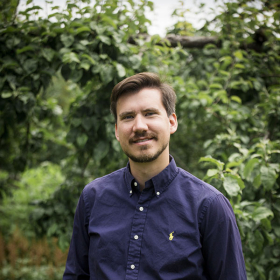
Johannes B., responsabile delle politiche
Storico di formazione, sono un esperto in materia di diritti fondamentali. Lavoro alla Commissione europea dal 2015, prima come vicecoordinatore per la lotta contro l'antisemitismo e ora come responsabile dei programmi di finanziamento dei valori dell'UE, dei diritti fondamentali e della memoria europea.
Ho iniziato la mia carriera presso la DG Istruzione e cultura, nell'ufficio del direttore generale aggiunto. Durante i 6 anni alla Commissione ho lavorato in vari dipartimenti, tra cui l'unità "Politiche per la gioventù" della DG Istruzione e cultura e l'unità "Politica di asilo" della DG Migrazione e affari interni.
Il mio lavoro è molto vario: spazia dalla presentazione dei finanziamenti dell'UE alle organizzazioni della società civile e ai ministeri, alla definizione di nuovi meccanismi di finanziamento per sostenere le attività di lotta contro il razzismo, la discriminazione e l'antisemitismo, alla garanzia di uno stretto allineamento tra le nostre priorità politiche in materia di uguaglianza e il sostegno che offriamo alle parti interessate.
Durante i miei studi universitari in storia ebraica presso l'Università Ludwig-Maximilian di Monaco di Baviera ho trascorso un anno accademico come borsista presso l'Università ebraica di Gerusalemme. Ho anche conseguito un master in studi europei presso il Collegio d'Europa di Varsavia (Natolin). Sono attivo nel più grande movimento giovanile filoeuropeo, i Giovani federalisti europei, anteriormente come presidente della commissione per gli affari esteri. Sono un ex studente della American Council on Germany’s Young Leaders’ Conference e partecipo ancora al gruppo di lavoro sulla diversità, l'equità e l'inclusione di tale istituzione.
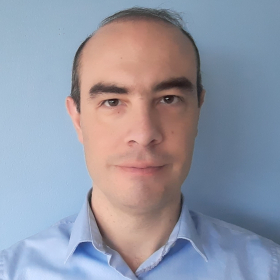
Emmanouil P., responsabile di progetti IT
"Ho iniziato a lavorare per le istituzioni europee come funzionario nel 2016, dopo più di 10 anni nel settore privato nell'ambito delle tecnologie dell'informazione. Dal febbraio 2021 sono membro della Direzione generale dell'Innovazione e del supporto tecnologico del Parlamento europeo.
Il mio incarico attuale prevede la gestione di progetti di tecnologia dell'informazione nel promettente settore dello spazio di lavoro digitale e della trasformazione digitale.
È stimolante scoprire in che modo le soluzioni informatiche gestite e gli sforzi compiuti facilitano il funzionamento di un'istituzione con una struttura complessa e diverse migliaia di dipendenti e parti interessate.
Il senso generale di responsabilità che occorre dimostrare mi motiva a puntare all'eccellenza, dal momento che i risultati del mio lavoro hanno un'elevata visibilità e un impatto diretto sul lavoro quotidiano dei deputati al Parlamento europeo e degli alti funzionari dell'istituzione.
L'ambiente di lavoro è eccezionale, consente di prendere iniziative e di utilizzare le proprie competenze e conoscenze. I miei superiori mi hanno fortemente sostenuto facilitando un'integrazione armoniosa nell'ecosistema del Parlamento europeo. Apprezzo particolarmente l'atmosfera multiculturale, la possibilità di interagire quotidianamente con colleghi di diversi paesi europei.
Le opportunità di formazione sono numerose e si investe nello sviluppo professionale, cosa che rappresenta un punto cruciale per un settore in rapida evoluzione come le tecnologie dell'informazione."
Responsabile di progetti IT, Direzione generale dell'Innovazione e dell'assistenza tecnologica, Sistemi informativi istituzionali, Parlamento europeo

Goran Lucic, lingustic assistant in the Croatian-Slovenian lawyer-linguist tandem team
I started working for the European institutions in 2014, moved around a lot as contract/temporary agent in the Council and the European Commission, before finally joining the Quality of Legislation Directorate (DQL) in 2019 as assistant to lawyer-linguists.
Working in the DQL is quite challenging and interesting at the same time, as we are the final instance before something gets published in the Official Journal of the EU, so we have to be very attentive and have an eye for eventual typos and/or other kinds of mistakes.
The thing about working here that I like a lot is that, although we are in a multicultural environment, in our rather small tandem teams we are in constant touch with our mother-tongue.
Another very important aspect is that, on the one hand, we are not at all micromanaged by the hierarchy, while, on the other hand, managers do take care of their staff's needs by empowering them to get adequate training to guarantee the best possible service.
Lingustic assistant in the Croatian-Slovenian lawyer-linguist tandem team at the Council of the European Union
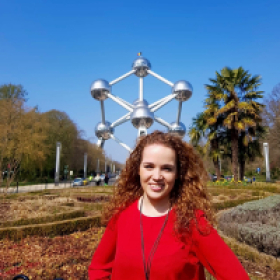
Tessa Pouels González, lawyer-linguist assistant in the Dutch team in the Directorate Quality of Legislation
My name is Tessa, I come from Spain and I work as a lawyer-linguist assistant in the Dutch team.
When I finished my master's degree in legal translation, I thought that my next step would be to work as a freelancer, but I am proud to say that the European institutions offer opportunities to motivated young people eager to be part of the European project.
Working at DQL – where we check the drafting quality of legal acts of the European Council and of the Council – is both challenging and rewarding, as you get to participate and gain an insight into the process of adopting legislation. It is most motivating to be part of a multicultural team with colleagues from different academic, professional and social backgrounds where you are constantly encouraged to continue growing personally and professionally, while benefiting from good working conditions, a wide range of training opportunities and the possibility to change jobs between services and institutions.
If you always wanted an international challenging and interesting career, I highly recommend working for the European institutions. Besides, life in Brussels is enriching and interesting with many activities and events to enjoy.
Lawyer-linguist assistant in the Dutch team in the Directorate Quality of Legislation (DQL) at the Council of the European Union
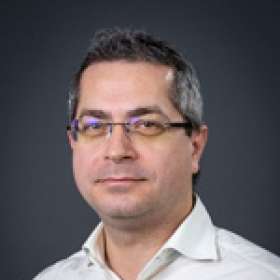
Todor T., capo dipartimento Sistemi centrali
"Sono nato al di fuori dell'Unione europea, dietro la cosiddetta "cortina di ferro", e sono cresciuto in un periodo di grandi cambiamenti. Mi sono laureato presso l'Università tecnica di Sofia. Poco dopo il mio paese di origine è entrato nell'UE e, da un giorno all'altro, mi sono trovato a lavorare nell'Unione europea: è diventato più facile viaggiare in altri paesi, lavorare per una società straniera e vivere all'estero. Per diversi anni ho lavorato e vissuto nell'Unione europea e ora lavoro per l'UE.
Dopo 7 anni di esperienza nel settore privato delle tecnologie dell'informazione, nel 2011 sono diventato agente temporaneo presso una delle 34 agenzie decentrate dell'UE. Lì ho capito che lavorare per l'Unione europea è più di un'esperienza multiculturale: si tratta di applicare le tue competenze e conoscenze per il bene comune delle persone che vivono in paesi diversi, ciascuno dei quali può avere un modo diverso di fare le cose. In qualità di gestore di un portafoglio applicativo, la mia missione era quella di garantire il corretto funzionamento della soluzione SAP ERP. Con un gruppo di specialisti abbiamo analizzato le esigenze operative aggiornate e successivamente costruito e predisposto funzionalità aggiuntive necessarie.
Nel 2012 ho partecipato a un concorso EPSO come questo: l'Unione europea cercava specialisti di TIC qualificati ed esperti, interessati a far parte del suo personale. Dopo aver superato il concorso ho iniziato a lavorare per la DG ITEC del Parlamento europeo, dove lavoro ancora oggi. E le organizzazioni sono come degli organismi viventi, i loro processi maturano, i dati e la capacità crescono, dei progetti vengono creati, svolti e conclusi, succede sempre qualcosa, spesso perché cambiano le priorità.
Negli ultimi 8 anni ho svolto tre ruoli diversi alla DG ITEC: responsabile di progetto, responsabile di un'applicazione e ora capo dipartimento. Lavorare per il dipartimento informatico dell'organizzazione che rappresenta gli interessi di 450 milioni di cittadini dell'UE è al tempo stesso una responsabilità e un impegno, e tutto inizia dallo spirito di squadra. È anche una carriera impressionante per un ragazzo che ha scelto l'informatica grazie ai videogiochi."
Direzione generale dell'Innovazione e dell'Assistenza tecnologica, Unità Sistemi informatici istituzionali, Parlamento europeo

Ann De Wachter, linguistic assistant at the Dutch translation unit
My name is Ann, I am Belgian and I speak Dutch as mother tongue as well as English, French, Spanish and German. I joined the European Commission in 2003 with a temporary contract and became a permanent official in 2005. With good preparation and determination, passing an open competition is certainly not a mission impossible!
Working for the EU has been nothing but a positive experience. You work with enthusiastic, dedicated and competent colleagues. You can constantly develop your professional and personal skills through a large variety of courses. The institutions promote job mobility, so you can acquire experience in different positions throughout your career.
I worked in four different positions before I joined Directorate-General for Translation (DGT) Dutch language department as a linguistic assistant. I like the variety of my tasks and the independent way of working. I can put my language knowledge, eye for detail and practical approach to good use. Good word processing, prioritising and communication skills are also important, as well as a proactive attitude.
In my work for DGT, I deal with different types of texts related to all domains in which the EU is active. I will never forget the process leading to the Brexit-agreement. It took a whole team of translators and assistants to ensure timely delivery of the translations involved. International crises, such as the war in Ukraine, also have an impact on your work. Events like these, both foreseen and unexpected, show how much our work – that of assistants included – is subject to the ins and outs of EU-politics.
I also love working in an international and multicultural environment. When you walk through the building, you see posters and newspapers from different countries. In the elevator or cafeteria, you hear different languages. When you socialize with your colleagues, you learn a lot about their culture and habits. Even though my direct colleagues, from the Dutch language department, all speak Dutch as a mother tongue, comparisons between Flemish and Dutch from the Netherlands can lead to amusing and animated conversations.
Linguistic assistant at the Dutch translation unit at the European Commission (Directorate-General for Translation)
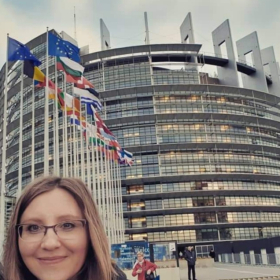
Maja Vuksan Knežević - Translation assistant at the Croatian Translation Unit
I joined Parliament in 2017. Previously, I had worked as a translator in Croatia and my linguistic background helped me to master various tasks involved in this job, but it was not a prerequisite. I work with colleagues from diverse academic and social backgrounds and I am happy to say that I have learned a lot from them, as the work of a translation assistant is very diverse and dynamic.
What I enjoy the most about my job is the feeling of belonging and contributing to the European project – especially given the essential role that the EP's multilingualism policy plays in protecting the cultural and linguistic diversity of the Union. It promotes transparency and understanding – values that are also highly respected in our work environment.
With its wide variety of training opportunities and emphasis on professional development, the EP is a great place to learn and develop. The work environment is welcoming and allows you to take initiative and use your skills and expertise for the greater good, while its multicultural nature gives you an opportunity to meet incredible people from all over Europe who share similar values.
Translation assistant at the Croatian Translation Unit, Directorate-General for Translation (TRAD), European Parliament
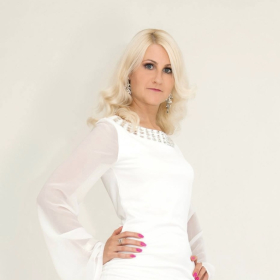
Jana Zhvanko, linguistic assistant at the Estonian Translation Unit
I decided to participate in an EPSO competition for translation assistants; I passed it, and joined Parliament in 2008! Being an open, active and communicative person, I made the most of it and enjoyed every single day of my working life here – and I still do.
My work involves the use of a range of both linguistic and technical skills, which makes it very dynamic. Given that we use a variety of different tools and working methods, and that our technical instruments are always being developed further, there is always room to grow personally and broaden one’s knowledge.
For me, working for DG TRAD at Parliament is like building a linguistic bridge between the political world and the citizens of each member state. The EP’s newest projects bring us closer to people, and help us to connect and interact with them. I see myself as part of a big structure: as it is the case with all complex, multi-faceted mechanisms, every single part of the system is important. Only together do we make it work!
Linguistic assistant at the Estonian Translation Unit at European Parliament (Directorate-General for Translation (TRAD))

